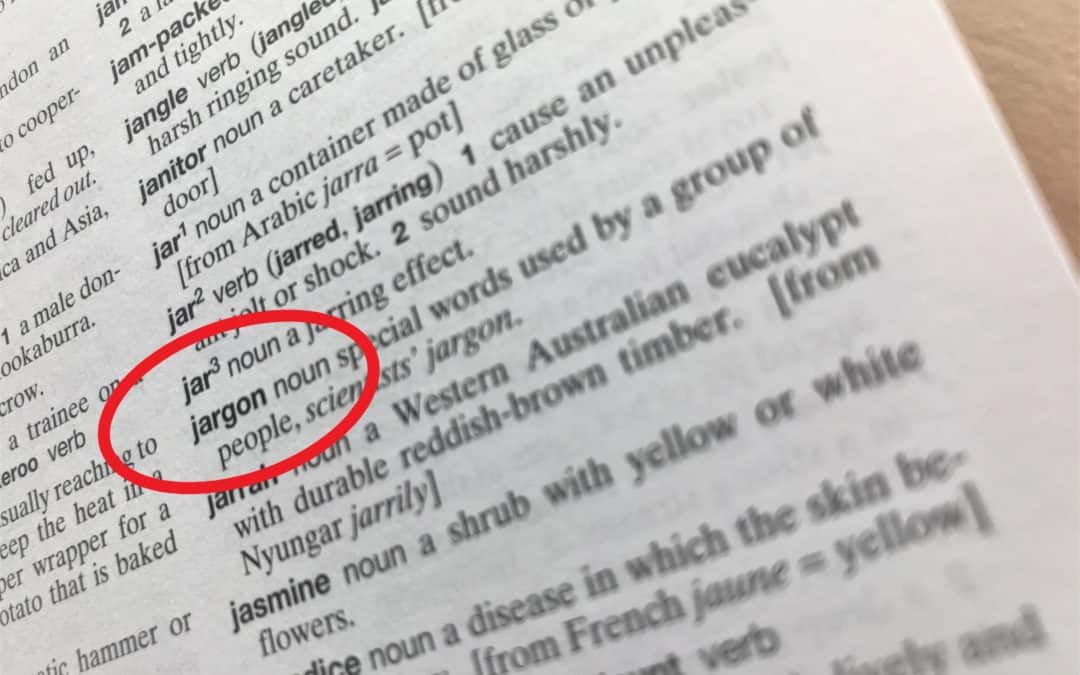A jargon-filled document is all it takes to make some legal clients run for the hills. But with simplified drafting, there’s also an opportunity to foster excellent client relationships and attract new business.
As a legal copywriter, my website is a necessary business tool. Through it, I field all sorts of enquiries about my services. But lately there have been some specific enquiries which indicate an unexpected trend. And it’s all to do with legal jargon.
When legal clients turn to copywriters for help
Occasionally, I’ll get an enquiry from a legal client along these lines:
Them: “Hi, I need a legal copywriter.”
Me: “That’s me. How can I help?”
Them: “I’ve got this document I can’t understand. I need a copywriter to rewrite it into simpler language.”
Me: “What’s the document?”
Them: “It’s a [contract/disclaimer/code of conduct/policy/etc].”
Me: “Uh?”
Them: “I had it drafted by a lawyer but I can’t understand it.”
Me: “Wow. Okay. Let’s talk.”
If you’re a lawyer, you’re probably in a state of disapproval right now. You know (and as a former lawyer, I also know) that even the most straightforward edit, for example deleting a full stop, may change the meaning or effect of the document. Or part thereof. (I couldn’t resist a little bit of lawyer lingo.)
You may also disapprove of a client asking a copywriter to do this kind of work. I mean, copywriters aren’t practising lawyers. What would they know?
And you’re right.
Kind of.
Why clients ask copywriters to sort out the legal jargon
This is a good point at which to pause and consider: is disapproval the right response? A better reaction may be concern. Or even alarm.
There’s an increasing pool of law clients who are adrift. They don’t understand their lawyers’ work, even though they’ve paid for it.
They requested it.
They need it.
But they can’t use it.
Copywriter Tanya Abdul Jalil notes the effect of this problem from the other side of the fence:
I met a debt collector recently who said his biggest clients were private schools with very wordy and complex t’s and c’s that were confusing for parents. So a lot of the parents he contacted for the debts didn’t realise what they had signed/agreed to (for example, paying for a term or year, even if you pull the kids out).
Then there’s the problem that the clients may not even tell you they can’t understand the document.
They may give up and go to a copywriter instead.
Copywriter Cal Chikwendu worked with a lawyer on a project. The legal terms and conditions became a sticking point. She says:
The lawyer was briefed about the business ethos and requirement for non-legalese approach. Despite this the T&Cs were too legalese! This was raised with the lawyer to the point that I was asked to draft some suggestions or provide some samples of T&Cs using a more relaxed approach.
Angela Pickett, a community volunteer and copywriter, describes the issue succinctly:
We have problems with documents, especially contracts drafted by lawyers years ago, that use legalese for the sake of it. We discussed getting the lawyer to look at them, but that was the problem in the first place.
Why legal jargon is a problem for your law practice
I understand that fiddling with a legal document is a high-risk undertaking. So, I decline to do this work. But I do refer those clients to lawyers who do a great job cutting down the legal jargon and promoting readability.
On the other hand, there are plenty of other copywriters who’d give this type of work a red-hot go. Who may not understand why a clause was drafted in a particular way, or the importance of using (or not using) punctuation.
Lawyers have a professional obligation to communicate effectively with their clients. If the client can’t understand the document, the lawyer hasn’t met the requirement.
And most important of all, in this scenario, it’s not the client’s fault. According to copywriter Josh Rose:
I‘ve had a lawyer draw up a letter when I was chasing up someone who owed me money. I could understand most of it, but there was one part that just baffled me. After re-reading many times and exhausting Google (and my own patience), I finally asked the lawyer what it meant. He was fine with explaining it to me. And he explained it well. Which left me thinking, why couldn’t he just write that in the first place?
How you can help your clients, and why you should
If you’re a lawyer, here’s the challenge.
Question what you’re doing.
Think about it.
Critically.
Is there a better, more straightforward way of drafting that document?
Do you really need to stick to the legal precedent? And when was that precedent drafted, anyway?
Here’s an excellent opportunity to grow your business. It’s a simple concept: free your documents from the shackles of legal jargon and go for plain, clear language. Your clients will love it. They’ll refer you to their mates and colleagues. They’ll sing your praises.
But don’t take my word for it. Anna Kolomycki, owner of Paramount Health, says:
When I was having a lawyer draft my subcontractor contracts it was all pretty straight forward. I went through it with a fine-tooth comb and just asked lots of questions. They were great in answering everything. So I did feel very comfortable with their service, the whole process, and what I was walking away with.
On the other hand, producing documents that are a tangled web of legalese may be a great way to lose clients, miss out on referrals and cop some unfavourable reviews.
Plain-English drafting is empowering for your clients. Give it a whirl. In no time at all, you’ll probably find yourself specialised in plain-English business law. In an era when law firms struggle to stand out from the crowd, this is a highly effective point of difference.
Find out more about simplifying your business communications with jargon-free, reader-friendly language. Or, get in touch and let’s chat about how my business can help yours.
By Kate Crocker
Does this article strike a chord with you? Leave a comment and let me know what you think.




